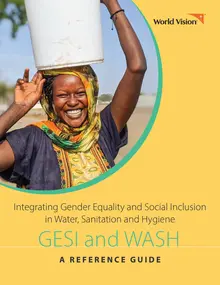Intégration de l'égalité des sexes et de l'inclusion sociale dans les domaines de l'eau, de l'assainissement et de l'hygiène, GESI et WASH
 |
Guide de référence
Integrating Gender Equality and Social Inclusion in Water, Sanitation and Hygiene, GESI and WASH
A Reference Guide
guide Sep 2022 ; 42 pages
Ed. WVI - Milton Keynes
Téléchargeable sous format: PdF
Site internet: https://reliefweb.int/report/world/integrating-gender-equality-and-social-inclusion-water-sanitation-and-hygiene-gesi-and-wash-reference-guide
Résumé:
L’approche de Vision Mondiale en matière d’égalité des sexes et d’inclusion sociale (GESI) s’efforce activement d’examiner, de remettre en question et de changer les normes sociales néfastes et les déséquilibres de pouvoir afin d’atteindre les objectifs d’égalité des sexes et d’inclusion sociale dans une zone de programme.
Ce guide de référence est conçu pour aider les praticiens de l’eau, de l’assainissement et de l’assainissement à mettre en œuvre des programmes WASH transformateurs en soutenant le changement dans les cinq domaines de l’ESI : accès, prise de décision, participation, systèmes et bien-être. Il fournit des informations sur la manière de concevoir, de mettre en œuvre, de suivre et d’évaluer un projet ou un programme WASH pour traiter le GESI. Abstract:
Water, sanitation, and hygiene (WASH) programs will not achieve World Vision’s mission or the Sustainable Development
Goals if we exclude the most vulnerable. WASH approaches need to be informed by World Vision’s Gender Equality and
Social Inclusion (GESI) approaches to ensure excluded groups can participate in WASH decision-making structures and
benefit equitably from WASH-related development interventions.
World Vision’s GESI approach actively strives to examine, question, and change harmful social norms and power
imbalances as a means of reaching gender equality and social inclusion objectives in any given context and technical
program area. GESI is integral to achieving World Vision’s “Our Promise” global strategy and child well-being objectives.
GESI approaches typically tackle access, decision-making, participation, systems, and well-being.1
Applying GESI principles to WASH work aligns to World Vision’s Core Values, especially: “We value people. We regard all
people as created and loved by God. We give priority to people before money, structure, systems, and other institutional
machinery. We act in ways that respect dignity, uniqueness, and intrinsic worth of every person - the poor, the donors, our staff
and their families, boards, and volunteers. We celebrate the richness of diversity in human personality, culture and contribution.”
This reference guide is not exhaustive and we encourage each field office to innovate around GESI within WASH and to share case studies of promising and best practices with the WASH and GESI teams for dissemination and learning.
Publics-Cibles:
Acteurs de coopération , Technicien , Ingénieur, concepteur , Décideurs locaux ou nationaux , Santé (professionnels de la)
Mots clefs: |
assainissement (CI) (DT) (OP) (ope) , eau potable (CI) (DT) (OP) (ope) , genre (CI) (DT) (OP) (ope) , hygiène (CI) (DT) (OP) (ope) |
Editeur/Diffuseur: |
|
WVI
-
World Vision UK - Milton Keynes - Royaume Uni |
En cas de lien brisé, nous le mentionner à communication@pseau.org